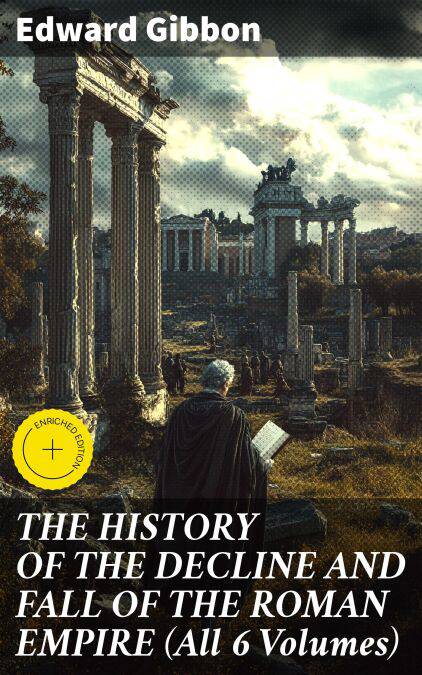
Bedankt voor het vertrouwen het afgelopen jaar! Om jou te bedanken bieden we GRATIS verzending (in België) aan op alles gedurende de hele maand januari.
- Afhalen na 1 uur in een winkel met voorraad
- In januari gratis thuislevering in België
- Ruim aanbod met 7 miljoen producten
Bedankt voor het vertrouwen het afgelopen jaar! Om jou te bedanken bieden we GRATIS verzending (in België) aan op alles gedurende de hele maand januari.
- Afhalen na 1 uur in een winkel met voorraad
- In januari gratis thuislevering in België
- Ruim aanbod met 7 miljoen producten
Zoeken
THE HISTORY OF THE DECLINE AND FALL OF THE ROMAN EMPIRE (All 6 Volumes) E-BOOK
Enriched edition. The Epic Saga of Rome's Spectacular Fall
Edward Gibbon
E-book | Engels
€ 1,49
+ 1 punten
Omschrijving
Edward Gibbon's monumental work, "The History of the Decline and Fall of the Roman Empire," spans six volumes, meticulously chronicling the complexities of Rome's gradual disintegration from the height of its power to the multifaceted factors contributing to its decline. Written in a lucid and elegant prose style characteristic of the 18th century, Gibbon employs a rich narrative interwoven with philosophical insight, rigorous analysis, and a keen awareness of historical context. His exploration delves into the interplay of political, military, and cultural shifts, presenting a comprehensive perspective not only on Rome but also on the broader themes of governance and civilization. Gibbon, an English historian and Member of Parliament, was profoundly influenced by the Enlightenment ideals of reason and skepticism towards traditional authority. His personal experiences, combined with his extensive reading of classical literature and contemporary historiography, equipped him with a unique lens through which to examine Roman history. His reflections on decay and renewal resonate profoundly with a rapidly changing 18th-century Europe, which was grappling with its own historical transformations. This work is an essential read for anyone interested in the intricacies of history and the profound influences of past civilizations on modern society. Gibbon's analysis not only illuminates the reasons behind Rome's downfall but also serves as a cautionary tale about the fragility of empires. Its timeless relevance and scholarly rigor make it a pivotal addition to any historical library.
In this enriched edition, we have carefully created added value for your reading experience:
- A succinct Introduction situates the work's timeless appeal and themes.
- The Synopsis outlines the central plot, highlighting key developments without spoiling critical twists.
- A detailed Historical Context immerses you in the era's events and influences that shaped the writing.
- An Author Biography reveals milestones in the author's life, illuminating the personal insights behind the text.
- A thorough Analysis dissects symbols, motifs, and character arcs to unearth underlying meanings.
- Reflection questions prompt you to engage personally with the work's messages, connecting them to modern life.
- Hand‐picked Memorable Quotes shine a spotlight on moments of literary brilliance.
- Interactive footnotes clarify unusual references, historical allusions, and archaic phrases for an effortless, more informed read.
In this enriched edition, we have carefully created added value for your reading experience:
- A succinct Introduction situates the work's timeless appeal and themes.
- The Synopsis outlines the central plot, highlighting key developments without spoiling critical twists.
- A detailed Historical Context immerses you in the era's events and influences that shaped the writing.
- An Author Biography reveals milestones in the author's life, illuminating the personal insights behind the text.
- A thorough Analysis dissects symbols, motifs, and character arcs to unearth underlying meanings.
- Reflection questions prompt you to engage personally with the work's messages, connecting them to modern life.
- Hand‐picked Memorable Quotes shine a spotlight on moments of literary brilliance.
- Interactive footnotes clarify unusual references, historical allusions, and archaic phrases for an effortless, more informed read.
Specificaties
Betrokkenen
- Auteur(s):
- Uitgeverij:
Inhoud
- Aantal bladzijden:
- 848
- Taal:
- Engels
Eigenschappen
- Productcode (EAN):
- 8596547806714
- Verschijningsdatum:
- 9/01/2024
- Uitvoering:
- E-book
- Beveiligd met:
- Digital watermarking
- Formaat:
- ePub

Alleen bij Standaard Boekhandel
+ 1 punten op je klantenkaart van Standaard Boekhandel
Beoordelingen
We publiceren alleen reviews die voldoen aan de voorwaarden voor reviews. Bekijk onze voorwaarden voor reviews.









